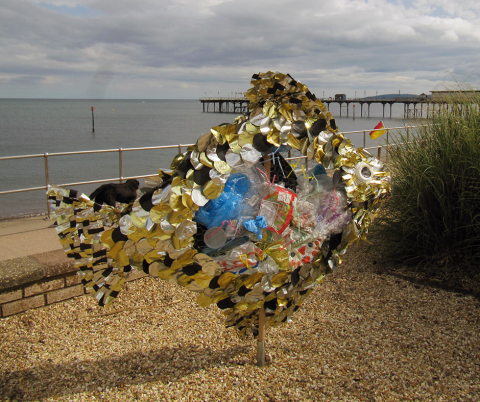Bioremediation of Plastic Pollution to Conserve Biodiversity (2024-2025)
Background
Plastic is now the most ubiquitous human-made substance in the world. Sadly, much of this plastic ends up in our waterways. Our oceans are home to enormous piles of plastic debris scattered throughout the water column. Ingestion of plastics by marine species has a substantial negative impact on their health, and plastic bioaccumulation in fish can transmit carcinogens up the food chain to our dinner plates.
Despite the staggering volume of plastic debris produced annually and the clear environmental and human health impacts, plastic waste continues to accumulate. There is an urgent need to develop novel strategies to combat plastics bioaccumulation. To address this issue, researchers have identified microbes that can convert plastic polymers into biodegradable products.
These enzymes represent powerful new tools for bioremediation efforts; however, these microbes are not yet capable of rapid, scaleable plastic degradation. Additional research is necessary to leverage these newly identified enzymes to create a system capable of rapidly degrading plastic to restore environmental health and conserve biodiversity.
Project Description
This project team has two primary goals. The first is to optimize its newly generated microbial systems for high-efficiency plastic degradation. Previous teams have used a bioinformatics and 3D protein structure prediction approach to discover a new bacterial species, Pseudomonas stutzeri, and show that it degrades plastic. They now plan to grow P. stutzeri in the presence of mutagens and select for the mutants with the best plastic-degrading capabilities.
Based on previous research, team members have hypothesized that increasing the temperature of plastic will make it easier to degrade. To test this, they bioengineered a system to express a temperature-tolerant plastic degrading enzyme in a temperature-tolerant bacterium, Thermus thermophilus. They will test the plastic-degrading capacity of this new system across temperatures (37-70°C) using measurement of dry plastic.
The team’s second major goal is to determine the harmful effects of plastic on cellular health. Past teams have catalogued the many chemicals added to plastics. Analysis of these plastic additives revealed over 100 known carcinogens, with thousands more that have not been tested. The team will treat cell cultures with some of the currently untested additives to better understand whether they may cause cancer.
Anticipated Outputs
Peer-reviewed manuscripts; development and testing of a novel enzyme to degrade plastic; data on plastic additives as potential carcinogens; website for searching health endpoints of plastic additives
Student Opportunities
Ideally, this project team will include 2 graduate students and 5 undergraduate students interested in molecular biology, genetic engineering, genomics, chemistry, computer science, bioinformatics, environmental science, public policy and/or marine science.
Team members will collaborate through team meetings, research presentations, journal clubs and experiential learning activities, such as lab work. Tasks will be divided based on the interests and experience of team members. Senior undergraduates and graduate students may have the opportunity to act as project managers and work with faculty to ensure the team is managed effectively. Students will also contribute to manuscripts for submission to peer-reviewed journals.
This project includes an optional summer component that is primarily geared toward students continuing from the 2023-2024 team. Summer work will run approximately June 1 through August 1 with students working about 20 hours per week.
Timing
Summer 2024 – Spring 2025
- Summer 2024 (optional): Subset of continuing team members conduct research; write papers and provide background informational interviews for new members
- Fall 2024: Onboard new team members and conduct literature review; design and perform experiments; troubleshoot and analyze data; present at weekly meetings; write final report in preparation for a manuscript
- Spring 2025: Continue data collection, analysis and writing; attend lectures, journal clubs and seminars related to student interests
Crediting
Academic credit available for fall and spring semesters; summer funding available
See earlier related team, Bioremediation of Plastic Pollution to Conserve Biodiversity (2023-2024).
Image: Ocean plastic pollution message, by Andy D’Agorne, licensed under CC BY-NC-ND 2.0

Team Leaders
- Meagan Dunphy-Daly, Nicholas School of the Environment-Marine Science and Conservation
- William Eward, School of Medicine-Orthopaedic Surgery
- Thomas Schultz, Nicholas School of the Environment-Marine Science and Conservation
- Jason Somarelli, School of Medicine-Medicine: Medical Oncology
/graduate Team Members
-
Cadmus Yeo, Biomedical Engineering-MS
-
Greg Merrill, Ecology-PHD
-
Zachary Holmes, Biomedical Engineering-PHD, Biomedical Engineering-MS
/undergraduate Team Members
-
Sage Hirschfeld, Environmental Engineering(BSE)
-
Seojin Yoon, Biology (BS)
-
Ashley Huang, Environmental Engineering(BSE)
-
Alexander Hong, Interdepartmental Major
/yfaculty/staff Team Members
-
Andrew Read, Nicholas School of the Environment-Marine Science and Conservation
-
Beatrice Schleupner, School of Medicine-Orthopaedic Surgery
/zcommunity Team Members
-
Conservation X Labs
-
Henry David Thoreau Foundation
-
North Carolina Museum of Natural Sciences
-
Seaworld
-
Dolphin Quest
-
RTI International
-
Gamini Mendis, Penn State Behrend
-
East Durham Children's Initiative
-
Durham Public Schools, City of Medicine Academy
-
Duke University Marine Lab
